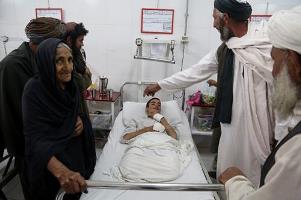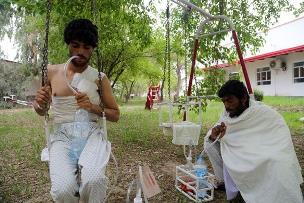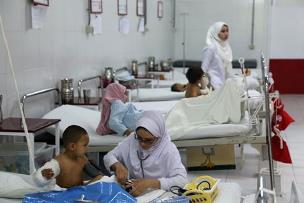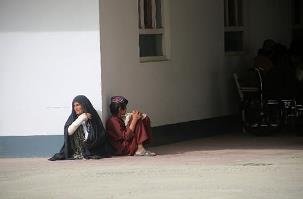 Nazo stands by his grandson at the Emergency Hospital in Helmand. WHO/G.Elham
Nazo stands by his grandson at the Emergency Hospital in Helmand. WHO/G.Elham
“Without this hospital, I would have lost my life”
8 June 2017 – 60-year-old Nazo stands at the bedside of his grandson Rahmatullah, 19, who was badly injured by a roadside bomb in Lashkar Gah, the capital of Helmand province in southern Afghanistan. Rahmatullah lost both of his legs in the blast, and received treatment at the Surgical Centre for War Victims run by Emergency, an Italian NGO.
“There is a fight going on everywhere and you can hear gun shots from everywhere. I fear that peace will never come,” Nazo says.
For the past 3 years, WHO has supported the provision of trauma care services in Helmand province through Emergency’s 90-bed Surgical Centre and 6 first aid trauma posts operated by the NGO. Funding from the European Civil Protection and Humanitarian Aid Operations (ECHO) has enabled WHO to support the full operation of the hospital, including the provision of essential medical supplies, equipment and medicines and training health workers on mass casualty management and first aid.
“We do this work to save Afghan lives”
From June 2016 to March 2017, the Emergency Surgical Centre treated over 6500 trauma patients while Emergency’s first aid trauma posts supported by WHO and ECHO stabilized and treated over 10 000 casualties and referred over 500 patients to the main hospital in Lashkar Gah.
 Nooryali’s lungs sustained serious injuries in an attack on his checkpoint. WHO/G.ElhamHelmand has long been among the provinces most badly affected by conflict.
Nooryali’s lungs sustained serious injuries in an attack on his checkpoint. WHO/G.ElhamHelmand has long been among the provinces most badly affected by conflict.
Nooryali, 28, a police officer from Helmand’s Gereshk district, received treatment at the hospital after his checkpoint was attacked by anti-government elements. He was shot in the chest and sustained serious injuries to his lungs.
After the attack was over, Nooryali’s colleagues brought him into the Emergency hospital for treatment.
“Without this hospital, I would have lost my life,” Nooryali said. “Too many people in Helmand and other parts of Afghanistan die because they cannot access these kinds of hospitals. The Afghan and foreign doctors and staff here are doing a great job, this place feels like a home to me.”
Babu, 60, was injured when a rocket hit her home in volatile Marjah district. She was hospitalized for 7 days and returned for regular check-ups.
“After the blast, I woke up here at this hospital, I don’t know who brought me here then. I’m very happy with the services I received at this hospital, all the staff were looking after me. I wasn’t able to do anything and they supported me with everything,” Babu says.
 Nurse Zahra checks on a patient. WHO/G.ElhamThe lack of trained medical personnel, particularly women, remains a major challenge throughout Afghanistan, especially in the south. Emergency’s international staff focus on extensive on-the-job training, both theoretical and practical, to build the capacity of local staff to effectively stabilize and treat trauma cases.
Nurse Zahra checks on a patient. WHO/G.ElhamThe lack of trained medical personnel, particularly women, remains a major challenge throughout Afghanistan, especially in the south. Emergency’s international staff focus on extensive on-the-job training, both theoretical and practical, to build the capacity of local staff to effectively stabilize and treat trauma cases.
“Life is very difficult in Helmand, we always live in fear and my family even cannot sleep properly at nights. Sometimes there are many victims who come into this hospital, and we all feel very tired by the end of the day. But we do this work to save Afghan lives,” says Zahra, a nurse at the Emergency Surgical Centre.
Bringing trauma care closer to communities
Many areas suffering from conflict in Helmand lack health facilities, highlighting the need for stronger treatment and referral interventions at the community level. As fighting moves into civilian-populated areas, women and children often bear the brutal consequences.
To address these gaps, through ECHO funding WHO has supported the training of 36 community health workers in Helmand and 306 in other provinces in first aid, stabilization and support during referrals.
In the past year through ECHO funding, WHO supported the establishment of 6 first aid trauma posts in 6 districts in Helmand province. These trauma posts provide life-saving first aid and stabilize trauma victims, and they are connected to Lashkar Gah’s Surgical Centre by a free ambulance service operating 24 hours a day, 7 days a week.
Increased needs for specialized trauma care
 Babu waits for a check-up outside the Emergency Surgical Centre in Lashkar Gah. WHO/G.ElhamIntensifying conflict increases the need for specialized trauma care in Helmand and other provinces suffering from the dire consequences of ongoing war. Currently around 4.5 million Afghans live in conflict-affected districts with extremely constrained access to health services.
Babu waits for a check-up outside the Emergency Surgical Centre in Lashkar Gah. WHO/G.ElhamIntensifying conflict increases the need for specialized trauma care in Helmand and other provinces suffering from the dire consequences of ongoing war. Currently around 4.5 million Afghans live in conflict-affected districts with extremely constrained access to health services.
The number of civilian casualties claimed by the war continues to rise. In 2016, UNAMA documented 11 418 civilian casualties, an overall 3% increase compared to the previous record-high documented in 2015. In the first quarter of 2017, 2181 civilian casualties were documented - 715 dead and 1466 injured.
The provision of life-saving emergency health services to the most vulnerable is among the top priorities in Afghanistan’s 2017 Humanitarian Response Plan. The Health Cluster, led by WHO, continues to strengthen trauma care services around the country, with a focus on so-called “white areas” that are lacking government-run health centres and hospitals.
Related links
European Civil Protection and Humanitarian Aid Operations (ECHO)








